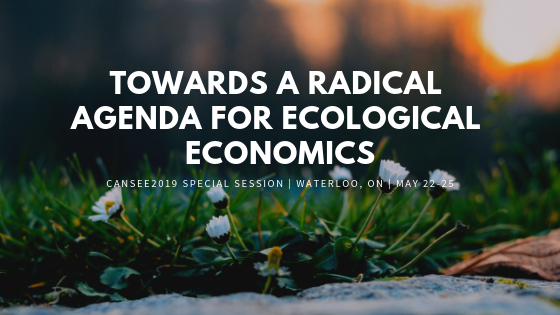CANSEE 2019 Special Session: Towards a Radical Agenda for Ecological Economics
University of Waterloo (May 22-25, 2019)
Session organizers: Kaitlin Kish, Vijay Kolinjivadi
Potential invited discussants (to pose questions and lead discussion at the end): Clive Spash, Giorgios Kallis
Context:
Neoclassical economics has been criticized for failing to adequately internalize what are viewed as negative environmental and social “externalities”. The result has been novel attempts within the field of Environmental or natural resource economics to “mainstream” socio-environmental problems into an overall managerial approach to maintain business-as-usual. This has included, but is not limited to, viewing nature as capital, seeing technology and engineered solutions as viable substitutes for resource exploitation, and turning ecological functions into a series of exchangeable goods and services.
In defiance of the roots of the discipline as emphasized in the work of Georgescu-Roegen, EE discourses are becoming increasingly instrumentalized and inserted as components of mainstream environmentalism to portray the limits that threaten the order or security of the status quo (e.g. Pasgaard et al., 2017). This is largely a result of asocial, apolitical and ahistorical understandings of how broad categories such as “nature” and “society” are conceived, often in isolation to each other, rather than dialectically co-produced. Instead, these universalized categories are brought together within EE with insufficient attention to the social and political processes of environment-making, as well as how such environments influence the potential for social change. The failure to sufficiently theorize and actualize EE research within a deeper social and political foundation has led to EE positions being increasingly muddled with environmental economics and other mainstream global development frameworks (e.g. UN’s Sustainable Development Goals; The Economics of Ecosystems and Biodiversity- TEEB). This muddling process reduces the possibility for greatly needed systemic transformation of the kind that EE advocates.
A radical EE agenda therefore lies in overcoming a tendency towards the technical and overly positivist “fix” within the status quo to instead embracing a deeper historical approach in understanding how unequal exchange of social and biophysical resources is itself influenced by profoundly social and political processes. It is an agenda that raises its voice against the substitutability of values through single monetary metrics or universal languages of valuation. Rather, a radical agenda for EE is one that is able to appreciate the historical, geographical, and political nuance into understanding economic production as embedded within social and biophysical dynamics. Such an agenda is not only epistemologically far-reaching, but ontologically ambitious as it explores the potentiality of alternative and diverse economic ways of being that remain rooted in mutual aid, empathy, solidarity between the human and non-human world, and in the spirit of anti-colonial, Indigenous, feminist, queer and anti-racist struggles around the world.
This special session welcomes presentations and other interventions that focus on exploring the co-production and inter-relation of both political and material dimensions within EE research, as a way to bring EE back to its radical roots.The call for contributions will encompass the following topics or themes:
- The role of political ecology in EE research (theoretical and empirical contributions)
- Philosophical and ethical contributions on society-nature dualisms
- Relational values within degrowth transformations
- Politicizing the limits to growth
- EE as reasserting the commons
- A feminist, queer, and decolonial take on EE
We would hope to see all presenters highlight ways in which neoclassical or environmental economics is becoming increasingly pervasive within the subject focus of their interventions. How is the entropic basis of economic transformation of social and biophysical resources being replaced with mechanistic understandings of economic activity? In what ways is EE getting “watered down” by mainstream environmentalism? What are some ways that we can re-focus attention on what EE is about? What are some ways this is already happening?
This session aims to be as inclusive as possible – open to all voices – with the ultimate aim of developing a Special Issue in Ecological Economics, incorporating our collective contributions. It is in the hopes that this Session will inspire ideas and generate meaningful collaborations towards this end.
To submit an abstract to this session please e-mail: kaitlin.kish@mail.mcgill.ca and vijay.kolinjivadi@mail.mcgill.ca

